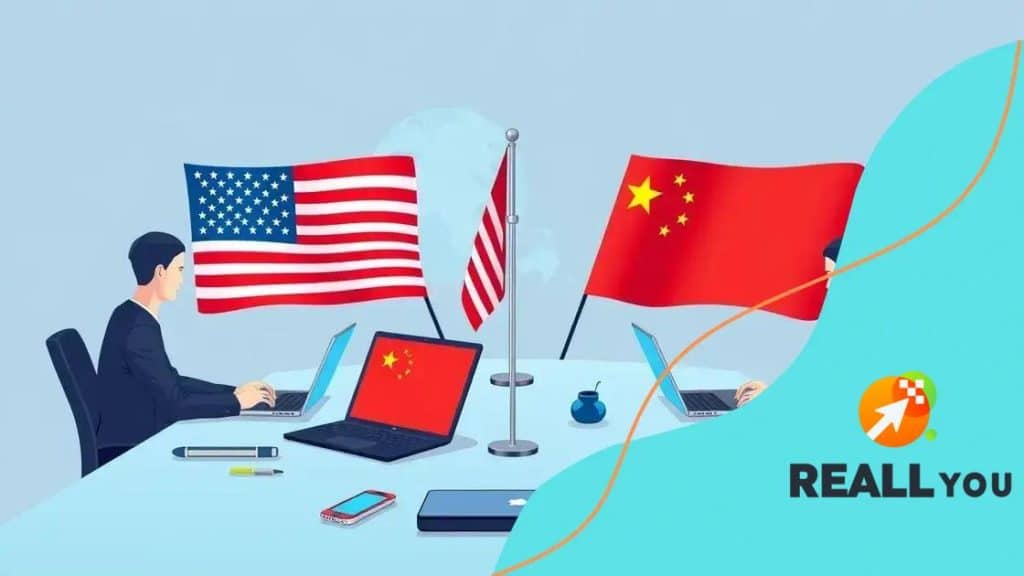Impact of the US-China trade war on global tech companies

Anúncios
The US-China trade war significantly impacts global tech companies by disrupting supply chains, increasing costs, and prompting firms to innovate and explore new markets for growth.
Impact of the US-China trade war on global tech companies is shaping industries and markets around the world. How are tech giants navigating this complex landscape? Let’s dive in to find out.
Anúncios
Understanding the US-China trade war
The US-China trade war has significant implications for the global economy, especially in the technology sector. This conflict began in 2018 when the U.S. imposed tariffs on several Chinese goods, leading to retaliatory tariffs from China. Understanding the underlying causes and effects is crucial for stakeholders in the tech industry.
Anúncios
Key Factors Driving the Trade War
Several factors contribute to the ongoing trade war. Primarily, issues like intellectual property theft, trade imbalances, and market access restrictions play pivotal roles. The U.S. government believes that China’s practices harm American businesses, while China sees tariffs as an attack on its growing economy.
Impact on Technology Supply Chains
As tensions escalate, the technology supply chains have been disrupted. Companies that rely on imported components face delays and increased costs. With tariffs affecting both nations, many firms are reconsidering their manufacturing strategies, often shifting to other countries. Some key points of concern include:
- Increased production costs for companies.
- Potential delays in product releases due to supply interruptions.
- Companies exploring alternative manufacturing locations.
These changes can alter market dynamics and affect pricing strategies. With varying regions adapting to the shifting landscape, the global tech industry must remain agile. Additionally, consumer choices may also evolve, influenced by rising prices and available options.
As this situation develops, global tech companies must keep a pulse on these factors to navigate the challenges ahead. The ramifications of the US-China trade war are far-reaching; thus, understanding these nuances allows companies to strategize better and mitigate risks effectively.
Key implications for technology supply chains
The US-China trade war has directly affected the global technology supply chains, creating challenges and opportunities for many companies. As tariffs rise, the cost of components increases, leading to shifts in how businesses operate.
Rising Costs and Production Changes
With tariffs impacting essential parts, companies find their production costs rising. Many tech firms are now considering alternative suppliers outside of China to avoid high tariffs. This shift is essential to lessen financial pressure on their operations.
- Identifying new suppliers in countries like Vietnam and India.
- Reassessing logistics and shipping routes.
- Potentially achieving better pricing strategies.
The decisions made now will have long-lasting impacts on the tech sector, as firms adapt to these changing dynamics.
Impact on Innovation and Product Development
Another implication of the trade war is its effect on innovation. With supply chains disrupted, companies may experience delays in product launches. This slowdown can hinder their ability to compete in rapid technological advancements.
Many firms are prioritizing flexibility in their designs to adapt to supply chain constraints. They might also invest in local production capabilities to maintain a more responsive approach to market changes. Devising strategies to mitigate delayed product development is crucial for staying relevant.
Indeed, the impact on technology supply chains brings significant challenges. However, it also offers firms the chance to innovate and explore alternative business models that can succeed in a more complex environment.
Challenges faced by global tech companies

Global tech companies are confronting several challenges due to the US-China trade war. As tariffs rise and markets fluctuate, these organizations must adapt quickly to shifting dynamics.
Supply Chain Disruptions
One major challenge is the disruption of established supply chains. Many tech firms depend on manufacturing in China for vital components. When tariffs increase, costs go up, forcing companies to seek alternatives or redesign their products.
- Identifying new suppliers can be time-consuming.
- Redesigning products may lead to delays in production.
- Logistical issues may arise as companies shift operations.
These disruptions can cause delays in product launches, affecting overall competitiveness in the market.
Market Uncertainty
Market uncertainty also poses a challenge. With changing trade policies, predicting consumer demand becomes complicated. Companies may hesitate to invest in new projects or technologies.
As markets respond to new tariffs, businesses find themselves adjusting forecasts continually. This unpredictability can hinder effective planning, resulting in inefficiencies and potential losses.
In addition, the global tech landscape is constantly evolving. Companies must not only navigate trade issues but also remain at the forefront of innovation. Balancing these demands requires significant focus and resources. Adaptability is key, as firms are required to pivot strategies to address emerging challenges and seize potential opportunities.
Overall, the challenges faced by global tech companies during the US-China trade war highlight the necessity for agile thinking and innovative approaches in times of uncertainty.
Opportunities arising from trade tensions
Despite the challenges presented by the US-China trade war, there are also opportunities for growth and innovation. Many tech companies are reassessing their strategies to leverage these trade tensions.
Emergence of New Markets
As companies look for alternatives to manufacturing in China, new markets are emerging. Countries such as Vietnam, India, and Brazil represent viable options for shifting production. This creates chances for businesses to tap into new customer bases and reduce dependency on a single market.
- Exploring cheaper production costs in emerging markets.
- Building relationships with new suppliers and partners.
- Adapting products to fit the preferences of new customers.
With this shift, companies can diversify their supply chains and potentially increase their market presence.
Investment in Technology and Automation
The trade war encourages tech firms to invest in technology and automation. By adopting advanced technologies, companies can enhance productivity and reduce costs over time. Innovative solutions such as AI and robotics can streamline production processes.
As firms transition, they may find that automation helps mitigate some of the impacts of rising wages and tariffs. This investment in technology often leads to improved efficiency and lower operational costs.
Moreover, innovation may enable tech companies to develop new products that cater to changing consumer demands. Overall, the opportunities arising from trade tensions offer pathways to reinventing business models and staying competitive in a rapidly evolving market.
Future outlook for tech industries
The future outlook for tech industries is shaped by multiple factors, especially in light of the ongoing US-China trade war. Companies are actively adapting their strategies to thrive in this changing environment.
Increased Focus on Innovation
As the competition heats up, innovation becomes crucial. Tech firms will likely invest more in research and development to create cutting-edge products. This push for innovation includes advancements in artificial intelligence, cloud computing, and cybersecurity.
- Faster product development cycles to meet market demands.
- Collaboration with startups to harness fresh ideas.
- Integrating sustainable practices into technology solutions.
Such strategies will help maintain competitiveness and address consumer expectations.
Emphasis on Global Diversification
With trade tensions impacting supply chains, companies are looking beyond traditional markets. Many are diversifying their operations to minimize risks and explore new growth areas. This means establishing partnerships with suppliers in different countries to ensure stability.
Furthermore, tech companies are assessing how to align their products with regional regulations and consumer preferences. This approach fosters resilience against market fluctuations, allowing companies to adapt quickly to challenges.
Overall, the future of tech industries will involve a blend of innovation and strategic diversification. By embracing these changes, companies can navigate the complexities of the global landscape and seize new opportunities for growth.
FAQ – Frequently Asked Questions about the US-China Trade War and Its Impact on Tech Companies
How has the US-China trade war affected technology companies?
The trade war has led to supply chain disruptions and increased costs for tech companies, forcing them to reassess their manufacturing strategies.
What opportunities have emerged for tech firms during this trade conflict?
Companies are exploring new markets and diversifying their supply chains, which allows for growth and reduced dependency on a single market.
Is innovation more important now for tech industries?
Yes, innovation is crucial as companies need to develop new products quickly to remain competitive amidst changing market conditions.
What is the future outlook for the tech industry?
The future looks promising, with tech companies focusing on adapting strategies, investing in automation, and seizing new opportunities to drive growth.







